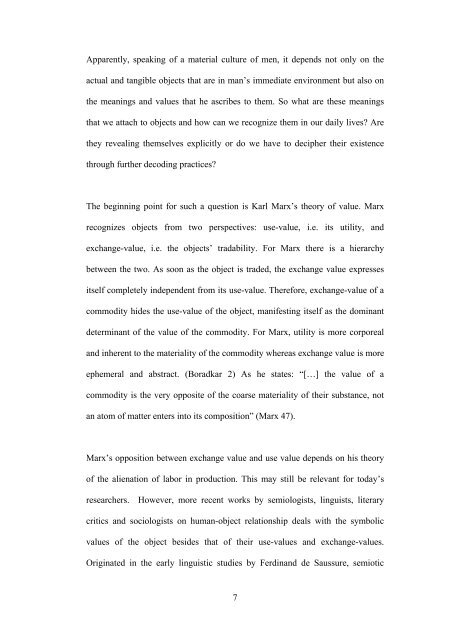virtualization of design and production a thesis - Bilkent University
virtualization of design and production a thesis - Bilkent University
virtualization of design and production a thesis - Bilkent University
Create successful ePaper yourself
Turn your PDF publications into a flip-book with our unique Google optimized e-Paper software.
Apparently, speaking <strong>of</strong> a material culture <strong>of</strong> men, it depends not only on the<br />
actual <strong>and</strong> tangible objects that are in man’s immediate environment but also on<br />
the meanings <strong>and</strong> values that he ascribes to them. So what are these meanings<br />
that we attach to objects <strong>and</strong> how can we recognize them in our daily lives? Are<br />
they revealing themselves explicitly or do we have to decipher their existence<br />
through further decoding practices?<br />
The beginning point for such a question is Karl Marx’s theory <strong>of</strong> value. Marx<br />
recognizes objects from two perspectives: use-value, i.e. its utility, <strong>and</strong><br />
exchange-value, i.e. the objects’ tradability. For Marx there is a hierarchy<br />
between the two. As soon as the object is traded, the exchange value expresses<br />
itself completely independent from its use-value. Therefore, exchange-value <strong>of</strong> a<br />
commodity hides the use-value <strong>of</strong> the object, manifesting itself as the dominant<br />
determinant <strong>of</strong> the value <strong>of</strong> the commodity. For Marx, utility is more corporeal<br />
<strong>and</strong> inherent to the materiality <strong>of</strong> the commodity whereas exchange value is more<br />
ephemeral <strong>and</strong> abstract. (Boradkar 2) As he states: “[…] the value <strong>of</strong> a<br />
commodity is the very opposite <strong>of</strong> the coarse materiality <strong>of</strong> their substance, not<br />
an atom <strong>of</strong> matter enters into its composition” (Marx 47).<br />
Marx’s opposition between exchange value <strong>and</strong> use value depends on his theory<br />
<strong>of</strong> the alienation <strong>of</strong> labor in <strong>production</strong>. This may still be relevant for today’s<br />
researchers. However, more recent works by semiologists, linguists, literary<br />
critics <strong>and</strong> sociologists on human-object relationship deals with the symbolic<br />
values <strong>of</strong> the object besides that <strong>of</strong> their use-values <strong>and</strong> exchange-values.<br />
Originated in the early linguistic studies by Ferdin<strong>and</strong> de Saussure, semiotic<br />
7
















